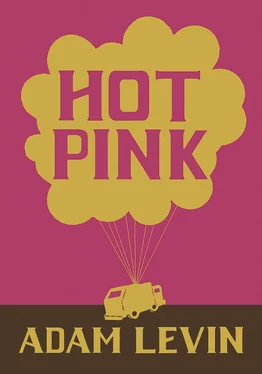Now it’s only a matter of time.
One summer evening three months later, our family, minus Dad, plus the limping rhubarb farmer, is eating barbecue at the picnic table in the backyard. Brian sits to the right of Timmy, and whenever Timmy speaks Brian says, “Who’s talking? I know I heard a voice, but for some reason I can’t tell where that voice is coming from. Funny,” he says, “I can’t seem to tell where just about any sound I hear comes from.”
It’s cooling down outside. A rabbit chases another rabbit until he catches her on the cement patio and they have sex until they become distracted, at which point they stop and stare at the sky and become distracted and start having sex. Moths bang their heads on lamps. Squirrels chew. Mosquitoes wobble. Fireflies incandesce.
The farmer’s wearing a checked bow tie. He’s had his shoes and socks off since he lit the grill, and Mom keeps admiring how “brave” and “open” he is for showing off the naked lump. Cutting into some sausage, he asks me if I’m interested in doing man’s work, and Mom, bouncing in his lap so her jowls sway, leans toward me, karate-chop hand at the side of her mouth. She chokes down potato salad and stage-whispers, “Olaf has big plans for you. He’s a man of ideas .” The farmer’s eyebrows rise and fall, rise and fall.
“I’m a homosexual,” I tell the table.
The farmer says, “Why do you want to go and say something like that at dinner?”
Timmy raises his fork over his head and jams it into the soft side of his own elbow. Misses the arteries. He twists the fork, then pulls it out of his arm and reaches across the table, directing the thing at the farmer. Tines drip blood onto Olaf’s sausage. Timmy says, “Don’t threaten my brother, Olaf.”
“Who said that?” Brian says.
Olaf says, “I wasn’t threatening no one, young man.”
Timmy drops the fork. “I’m sorry,” he says. “I misunderstood.” Sucking on his arm, he steps out of his sandals. He goes to the patio and starts kicking it hard, toes first. The rabbits keep pumping.
“Oh, Timmy,” Mom says.
“That’s the kind of thing,” Olaf says. “That temper of yours. Your boy’s temper,” he says to Mom. “That’s the kind of thing lost your other boy his ear, now isn’t it.” Olaf establishes eye contact with Brian in what seems to be a gesture of solidarity.
Brian says, “Don’t pity me , you milky fucken lame.”
We’re quiet for a minute, plate-gazing. It’s on me to break the silence.
I tell them, “I’m okay with myself.” I tell them, “I believe the world is mostly good, a self-repairing blemish on the face of God, an open system moving away from chaos, toward organization. I believe that each of its many seemingly awful components are essential to its betterment and will, in distant, perfect retrospect, be understood as wholly functional.” I’m in the middle of telling them, “To hate him requires us to hate ourselves and we don’t need to hate ourselves, we can have a little faith,” when there is a cracking sound and Olaf’s head smacks the table and Mom screams and Brian stands and Timmy crawls back to us and I look up to see Dad, free of stage armor, holding a blood-covered Bonnie by the waist. The blood is Olaf’s. The victory is Dad’s. He raises the doll, high, over his head.
It’s the first time we’ve seen her with all her skin on. Dad tosses her to me, and when I catch her against my chest, she nearly undoes the scoop of my arms.
“She feels heavy,” I say.
“She feels very heavy,” Dad says, “but boy is she beautiful!”
I pass Bonnie to Brian, who passes her to Timmy, who says thank you, and Brian doesn’t ask who said thank you, and Mom gets smelling salts from the first-aid kit and Olaf snaps awake and asks what happened to my noggin and Mom tells him that he banged it on the patio after tripping on his foot and Dad winks at her and that’s when we know they’ll patch it up.
Negotiations take seventeen days. Good Parent offers Dad a touch over half a million for the patents. In the end, he goes with Hasbro for something in the low seven-figure range.
Bonnies line the shelves of all the major chains by Thanksgiving. They cost ninety-nine dollars a pop and come with a free tube of paste. By mid-December, parents across the country take to camping out in toy-store parking lots the night before doll shipments come in. A couple predawn fistfights are reported in Lubbock. A Hasbro truck hijacked at gunpoint en route to St. Louis. A Christmas Eve riot in Denver.
Mom is liposuctioned, chin-tucked, retires early. Brian gets an ear with a built-in phone. Timmy is pierced, tattooed, has velvet-tipped fiberglass Pan’s horns implanted in his forehead. I can’t decide what I want, so I’m given a red Volkswagen and a condo where I lose my virginity to a skinny fatman who’s gone by sunrise. Dad builds a private kindergarten in Evanston, pays me to hang out and tell stories to the kids before naptime. I keep fucking up the happy endings, but they fall asleep anyway.
CONSIDERING THE BITTERSWEET
END OF SUSAN FALLS
(Author's note: Chapter 130,022 of this story, as seen in the print edition of Hot Pink, features text in its margins. Due to restrictions of the.epub format, marginalia cannot be sufficiently represented on your device, and so the text that constitutes the print version's marginalia has herein been rendered as a pair of footnotes. — Levin)
CHAPTER 130,020
DREAMS ABOUT FLYING
Susan Falls hates the flying dreams. She wakes up and she can’t walk, which is beside the point. She can’t walk when she wakes from non-flying dreams, either. The flying dreams speak of an unconscious obsession with walking, her therapist tells her.
The therapist tells her about the stages of death and dying, harping mostly on the denial stage. What the rest of the stages are isn’t important. What is important is that when the therapist tells her about the stages, he does so, he says, because he does not think the loss of Susan’s legs has been properly mourned. To Susan, this is nonsense.
She lost her legs as a baby, in the jungle, to gangrene, after the leopard bit her. So she’d never really had them to begin with, at least not long enough to require her to mourn their loss. Besides, what upsets her isn’t that she can’t walk, but that she has dreams which would seem to suggest that somewhere deep inside she wants to walk, when nowhere non-deep inside does she.
And tacky dreams at that. The flying is always travel-channel scenic: Susan soaring over the ocean or the mountains, between skyscrapers with puffy-cloud reflections on their windows. It might be different, might point to something real or individual about Susan, if she flew over the Gaza Strip or post-NATO Belgrade. Mazar-i-Sharif. She never dreams of what she wants to, though, no matter how hard she thinks about whatever that might be before she goes to sleep. Last night, for instance, she thought of Carla Ribisi’s ass for nearly an hour, and ended up cruising over the Grand Canyon at four thousand feet.
CHAPTER 130,021
THE ACCIDENT, PRETTY TO THINK SO
Susan and her mother are in the all-white kitchen, drinking orange juice, waiting for Susan’s father to come downstairs before eating the egg dish that Jiselle, the distant cousin who came to America to be an au pair but could not find a job as an au pair and so has become the cook, has made. Jiselle is on the balcony, smoking cigarettes.
“You don’t look so good today, Sus,” Susan’s mother says. “Bad dreams?”
Susan nods, staring through the glass table at the glass table’s frosted glass base. Where the kitchen isn’t white or transparent, it’s mirrored, and if she looks up, she risks being confronted with a vision of herself first thing in the morning.
Читать дальше











